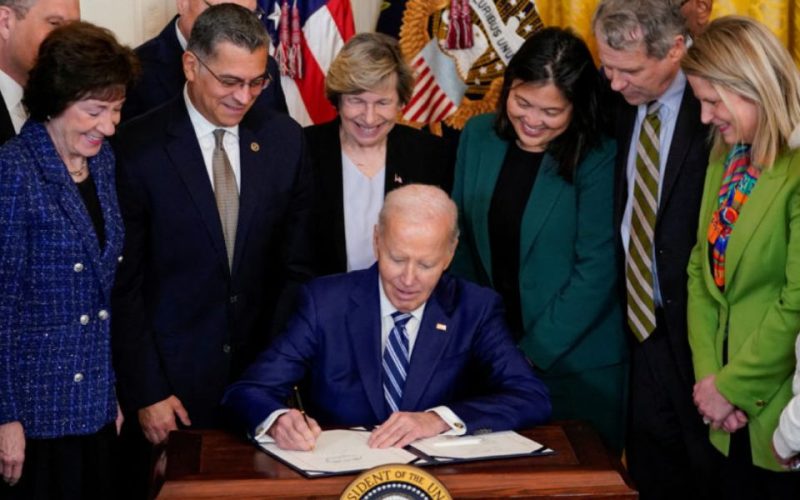President Joe Biden signed legislation on Sunday to increase Social Security payouts for current and former public employees, affecting almost 3 million people who get pensions for their work as teachers, firefighters, police officers, and other public servants.
Advocates believe the Social Security Fairness Act corrects a decades-old inequality, but it will also put pressure on the Social Security Trust Funds, which are facing an insolvency problem.
The measure repeals two provisions — the Windfall Elimination Provision and the Government Pension Offset — that limit Social Security benefits for recipients who receive retirement payments from other sources, such as state or local government retirement systems.
“The bill I’m signing today is about a simple proposition: Americans who have worked hard their entire lives to earn an honest living should be able to retire with economic security and dignity — that’s the whole point of the Social Security system,” Biden said during a signing ceremony in the White House East Room.
“This is a big deal,” he explained.
Biden was joined by labor leaders, retirees advocates, and Democratic and Republican politicians, including the bill’s key supporters, Maine Republican Sen. Susan Collins and departing Ohio Democratic Sen. Sherrod Brown, who earned a standing ovation from ceremony participants.
The Congressional Research Service predicted that the Government Pension Offset will lower the payments of 745,679 persons, or nearly 1% of all Social Security claimants, in December 2023. The Windfall Elimination Provision affected around 2.1 million persons, or roughly 3% of all beneficiaries.

The Congressional Budget Office predicted in September that repealing the Windfall Elimination Provision would increase monthly payments to impacted recipients by an average of $360 by December 2025.
According to the CBO, ending the Government Pension Offset would increase monthly payments by $700 on average for 380,000 beneficiaries receiving benefits based on living spouses in December 2025. The increase would be $1,190 on average for 390,000 or surviving spouses receiving a widow or widower benefit.
Those sums would rise over time as Social Security made regular cost-of-living adjustments.
The change applies to payments made in January 2024 and after, which means the Social Security Administration will owe back-dated payments. The legislation passed by Congress states that the Social Security commissioner “shall adjust primary insurance amounts to the extent necessary to take into account” changes in the law. It’s unclear how this will occur or whether anyone affected will need to take any action.
Edward Kelly, president of the International Association of Fire Fighters, stated that firefighters around the country are “excited to see the change — we’ve righted a 40-year wrong.” Kelly claimed that the rules were “far more egregious for surviving spouses of firefighters who paid their own quotas into Social Security but were victimized by the government pension system.”
The IAFF has approximately 320,000 members, not including the hundreds of thousands of pensioners who will profit from the change.
“Now firefighters who get paid very little can now afford to actually retire,” according to Kelly.
Brown, an Ohio senator who advocated for the concept for years, lost his reelection effort in November. The president of the American Federation of State, County, and Municipal Employees labor union, Lee Saunders, commended Brown for his advocacy.
“Over two million public service workers will finally be able to access the Social Security benefits they spent their careers paying into,” Saunders told reporters. “Many will finally be able to enjoy retirement after a lifetime of service.”
National Education Association President Becky Pringle described the measure as “a historic victory that will improve the lives of educators, first responders, postal workers, and others who dedicate their lives to public service in their communities.”
While Collins and several Republicans supported the legislation, Sens. John Thune of South Dakota, Rand Paul of Kentucky, and Thom Tillis of North Carolina voted against it. “We caved to the pressures of the moment rather than doing this on a long-term basis,” Tillis told The Associated Press last month.
Nonetheless, Republican backers of the bill argued it was a unique opportunity to fix what they saw as an unfair provision of federal law that harms public service retirees.
The future of Social Security has emerged as a key political issue, with the 2024 election being a particularly contentious one. Social Security benefits are paid to approximately 72.5 million people, including pensioners, the disabled, and children.
The new law’s policy changes will increase administrative workload for the Social Security Administration, which is already at its lowest staffing level in decades. The organization is currently on a recruiting freeze and has a staff of approximately 56,645 – the lowest number in almost 50 years despite serving more people than ever before.
The annual Social Security and Medicare trustees report, released in May, stated that the program’s trust fund will be unable to provide full benefits beginning in 2035. The new law will move the program’s bankruptcy date forward by nearly a half year.
Along with ratifying the Social Security Fairness Act, Biden signed the Butch Lewis Act early in his administration, saving two million union workers’ retirement pensions.
Reference: Higher Social Security payments coming for millions of people from bill that Biden signed










